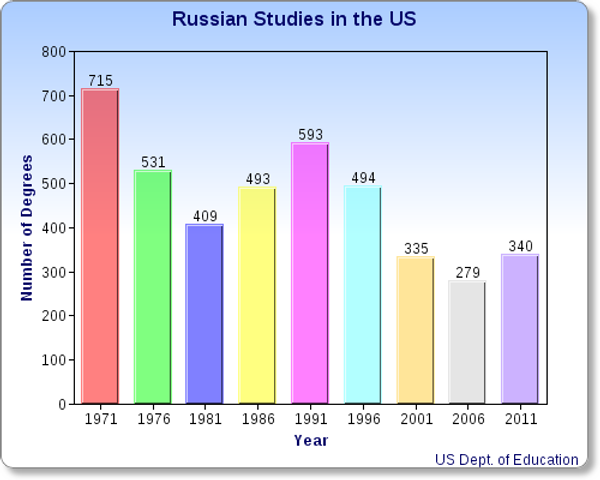WASHINGTON, May 8 (By Maria Young for RIA Novosti) – When Max Jenkins graduated last year with a B.A. degree in international affairs and a focus on Russia from George Washington University, he didn’t realize he was part of a national trend that experts say is a small but significant sign of revitalized American interest in all things Russian.
“I figured that after the university there would be a lot of opportunity in the private sector and also security, and it wasn’t an inundated concentration like Arabic or Chinese,” Jenkins said, of his decision to focus on Russia.
“The appealing aspect is the security opportunities with the military, in the government, even private security consulting firms,” he added during an interview with RIA Novosti.
Like Jenkins, a growing number of students in the United States are studying Russia, from its language and culture to its history and politics, an interest that mirrors a rollercoaster ride with sharp peaks and plummets that largely depend on who is in office and what is happening around the world, Russian studies experts tell RIA Novosti.
The number of students who graduated with Russian language degrees dropped from 768 nationwide in 1970 to just 271 graduates in 2003, a 40-year low, according to figures from the US Department of Education. The most recent statistics available show a 25 percent increase from 2003 to 340 graduates in 2011.
“Russian studies are enjoying a slow but steady resurrection. There are several causes for this, but the most important one is the increase in Russia's relative geopolitical importance in the wake of its impotence during the 1990s,” said Anton Fedyashin, executive director of the Initiative for Russian Culture at American University (AU), in comments to RIA Novosti.

“The country has re-emerged as a regional power and the decisions that the Russian government makes – whether people agree with them or not – have again become factors in Eurasian geopolitics and often beyond,” he added.
That spotlight on the world stage has attracted students all the way down to the middle and high school levels. Bonny Einstein teaches Russian to 350 sixth graders in an award-winning program in Latham, New York.
And in Maryland and Virginia, there are fewer Russian classes but more students, said Betsy Sandstrom, a Russian language high school teacher in Virginia and president of the American Council of Teachers of Russian.
“The enrollment in our existing programs is higher than it was in the mid-90s,” Sandstrom told RIA Novosti.
At Indiana University, enrollment in Russian classes at the annual Summer Language Workshop “have been at their highest since 1993” over the last two summers, said Mark Trotter, associate director of the school’s Russian and East European Institute, in comments to RIA Novosti.
The increases follow a multi-thronged, nationwide push to increase Russian studies enrollment at colleges nationwide.
Russian studies in the United States had declined so much that by 1983 the National Committee for Russian Language Study reported "enrollments in the Russian language have dropped more precipitously than those in any other major modern language," and listed 12 recommendations to strengthen enrollment.
The figures turned around, but dropped again in the late 90s and in January 2006 US President George W. Bush announced a National Security Language Initiative to expand teaching of strategically important world languages, including Russian.
“Critical languages, which means, important to this country’s economy and defense,” said John Schillinger, Professor Emeritus in the AU Department of World Languages and Cultures and Chair of the Committee on College and Pre-College Russian (CCPCR), which was formed to encourage Russian studies and tracks enrollment trends.
Back in the 1960s when he began Russian studies, “You knew Russia was a powerhouse, their dominance was unbelievably impressive, their impact on world affairs, it got everybody’s attention,” Schillinger said in an interview with RIA Novosti, adding that “the biggest increase was during the Gorbachev era because it was so newsworthy.”
Today, said several experts, Russia’s growing economy and rising significance on the global stage are part of what is driving the new interest in Russian studies in the US.
“Its geographical situation in Eurasia also makes it a significant participant in the two most important geopolitical trends in the twenty-first century: the rise of China as a global power and the changes in the greater Islamic world,” said Fedyashin.
“Because both regions border Russia, they affect what is going on inside the country, while Russia also affects those regions,” he added.
Schillinger doesn’t see a strong jump in the recent student enrollment figures, but rather a stabilizing of Russian studies despite increased global interest in Spanish, Chinese and Arabic studies, programs that are all “looking for a piece of the foreign studies pie,” he said.
The credit for much of that stability, he said, goes to Russian President Vladimir Putin – and possibly, a little to the saga of jailed punk rock band Pussy Riot.
“A number of programs were reporting they were getting interest strictly from the notoriety of Pussy Riot, and I think that was more anecdotal, but when you’re looking at Putin, you’re looking at someone who thrives on power and control, someone who understands the West because he was KGB,” Schillinger said.
“We’re thinking, ‘Okay, if he’s going to be that powerful we’ve got to be able to negotiate.’ It’s an important thing and I think it would attract more and more people to Foreign Service,” he said.
That’s an area that appeals to Max Jenkins, the recent graduate.
“At this point I’m leaning toward foreign service,” he said. “The ice is thawing, but there’s the mentality in both countries to always keep one eye on each other. And Russia, the country itself, is a crossroads, it’s really dynamic and I think there are lots of opportunities there.”

